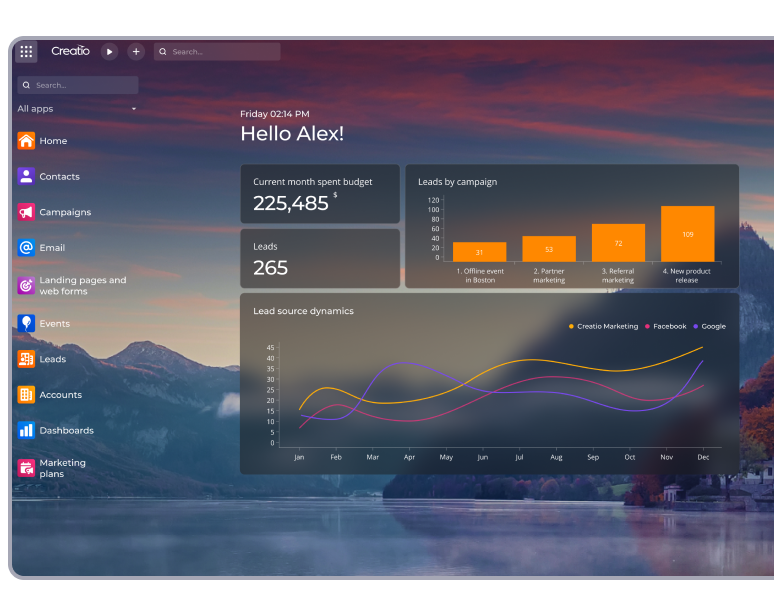-
No-Code
Platform
-
Studio
No-code agentic platform delivering the fastest time-to-value and the highest ROI
-
Studio
-
AI-Native CRM
CRM
-
AI-Native CRM
New era CRM to manage customer & operational workflows
CRM Products -
AI-Native CRM
- Industries
- Customers
- Partners
- About
Enhance Your Marketing Campaigns With Creatio

As digital transformation accelerates in every area of business, marketing technology stays at the front of innovation for every company. Instead of newspaper ads, customers now expect highly personalized omnichannel communication – and your digital marketing strategy needs to keep up with those expectations.
Marketing automation revolutionizes how brands connect with their audience and maximizes business outcomes while saving time and cost.
In this article, we’ll delve into the role and diverse applications of marketing automation, and explain how it can drive growth for your company.
What is Marketing Automation?
Marketing automation refers to using software to automate diverse marketing activities and empower marketers to easily access all the necessary data to execute personalized campaigns at speed and scale. Marketing automation connects your brand with the modern audience by streamlining, personalizing, and scaling marketing outreach across multiple channels such as email, social media platforms, websites, and more.
For example, let’s say you’re planning an ad campaign. Marketing automation software will help you determine your audience and messaging, highlight the best channels for the campaign, track leads, and engage them to go further down the funnel.
Marketing automation use cases
Leveraging marketing automation allows your business to carry out various marketing efforts and activities more effectively, such as:
- managing and tracking marketing campaigns,
- scoring and nurturing leads,
- streamline repetitive marketing tasks,
- analyzing customer behaviors and insights for data-based strategy,
- managing digital ads,
- delivering personalized content,
- cross-aligning your departments, specifically marketing and sales.
Marketing automation cuts time on routine processes and enables your team to get the desired results quicker. All in all, it makes your company more efficient and boosts customer engagement.
How Does Marketing Automation Work?
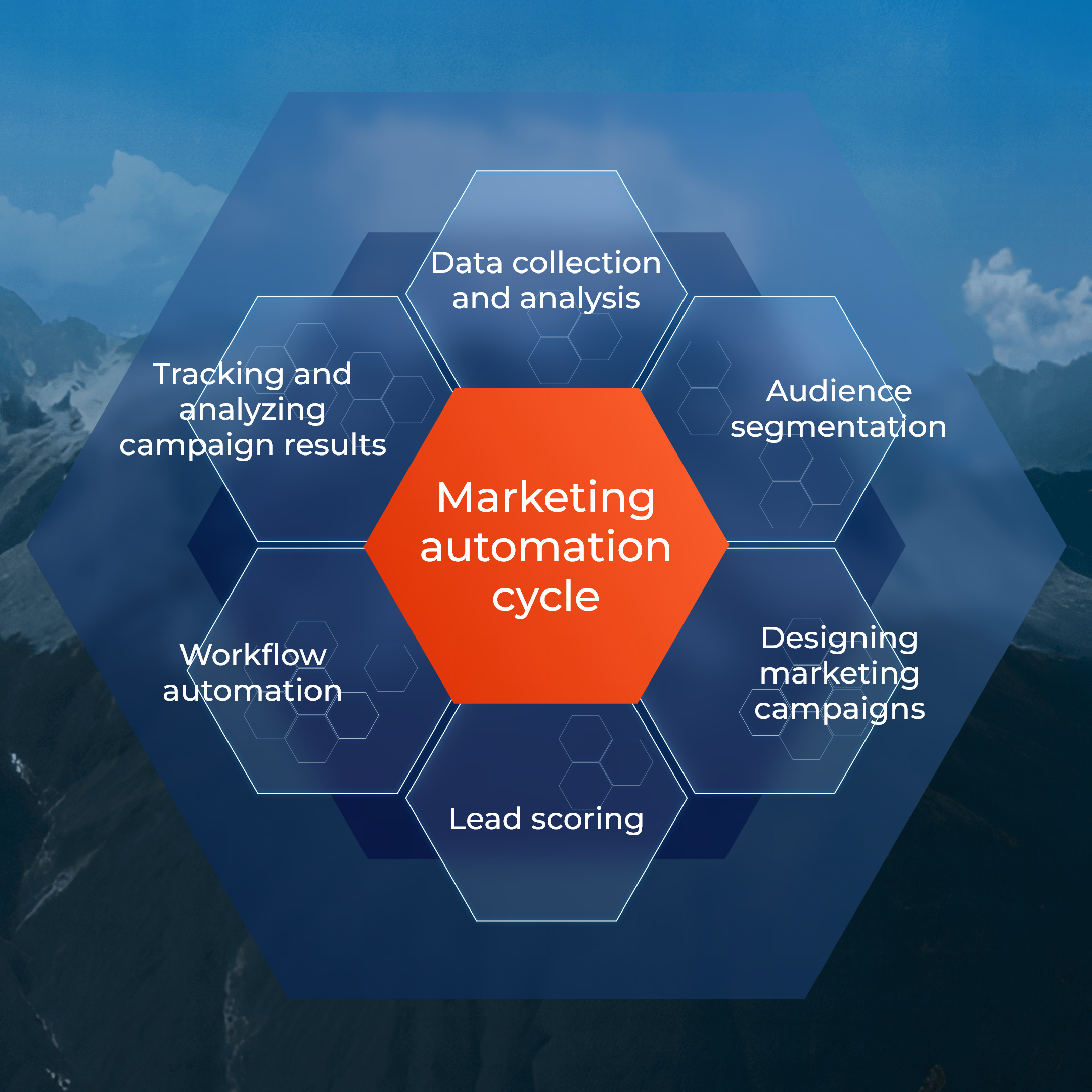
The first step is data collection – your marketing automation system gathers your audience’s data from various channels including website analytics, social media, emails, app usage, and chat conversations. The more channels your marketing automation tool covers, the more useful its analysis will be.
The data gathered helps build a 360-degree customer view. Based on this data, a marketing automation tool is able to automatically segment your audience and facilitate precise targeting and personalization.
Once you have these insights, you can design compelling marketing campaigns, determine appropriate channels, and prepare all the assets including ads, social media posts, landing pages, emails, and organic content.
Marketing automation software plays a pivotal role in lead scoring and nurturing. It systematically evaluates prospect behaviors and engagement, enabling targeted and timely follow-ups tailored to each lead's stage in the buying journey.
At this point, you can use a marketing automation solution to automate workflows. As marketing campaigns engage your audience, the software diligently assesses potential customers’ interactions with your brand online. Based on this analysis, it then triggers strategic personalized actions, such as inviting visitors to sign up for your mailing list or register for upcoming events.
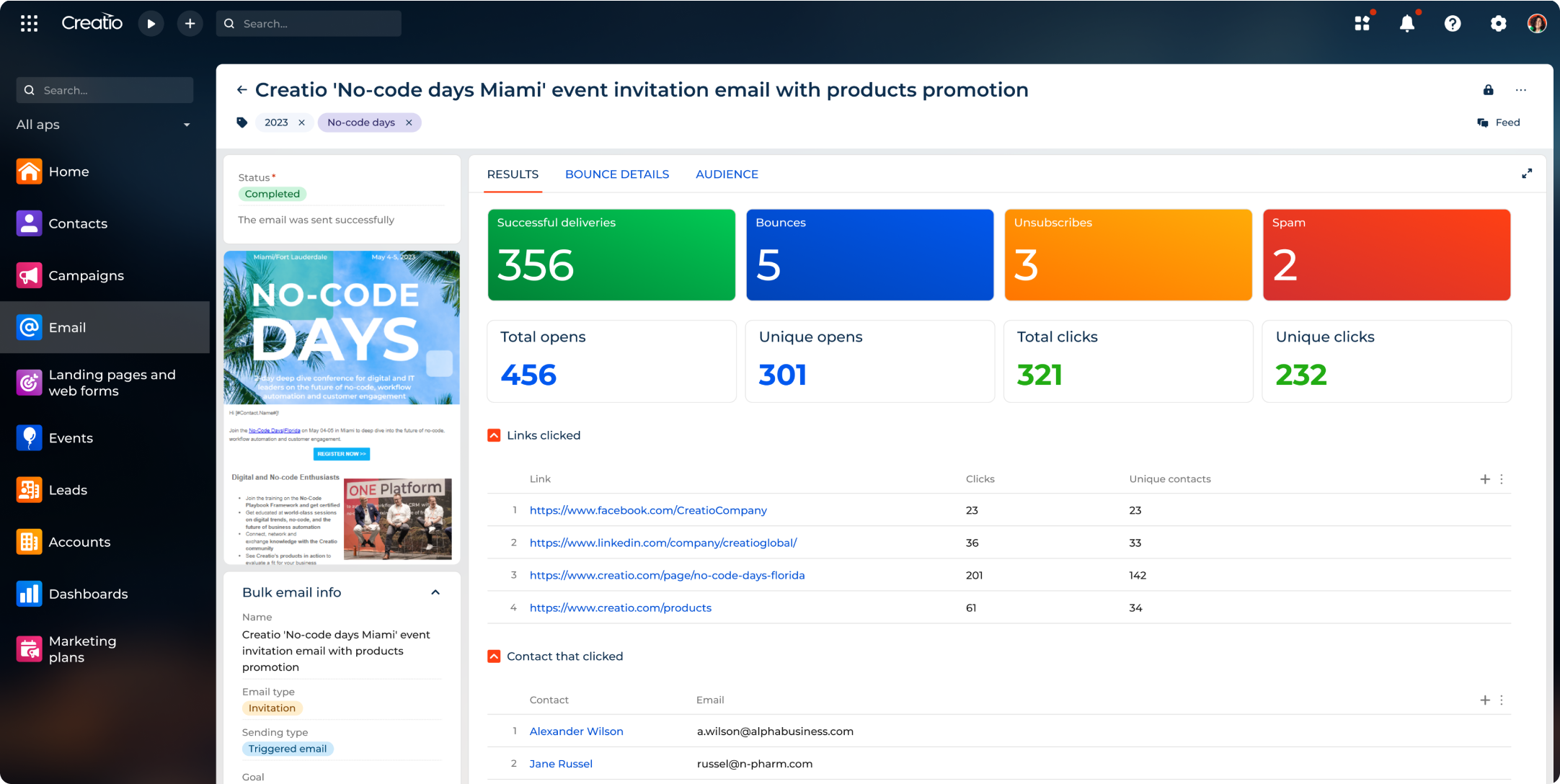
An example of marketing automation workflows
This process is particularly useful when integrated with your CRM since it’s relevant to both your marketing and sales departments. For this reason, marketing automation built into your CRM can be more productive.
The results of your campaigns are tracked and analyzed to further improve your marketing strategy. Thus, marketing automation represents a comprehensive approach to campaign management that spans the entire campaign cycle. By supporting your team at every stage, from execution to evaluation, marketing automation ensures a holistic approach that fosters ongoing improvement and optimization.
All of these processes and actions are fully automated; thus, there’s no need to spend hours analyzing website traffic and scheduling social media posts. Marketing automation tools utilize audience analysis to streamline your marketing activities and automate repetitive tasks to free up your marketing team for more challenging and strategic assignments.
Marketing Automation from Customer Perspective
While this article primarily explores how marketing automation helps businesses, it's important to acknowledge that the success of a company goes hand in hand with the satisfaction of your customers – both existing and potential.
Fortunately, marketing automation benefits your clients as much as it does you. It allows you to create a seamless and personalized experience for your audience at every touchpoint with your brand. Let’s explore the ways marketing automation serves customers.
Meet the customer where they are
A modern business on average manages 5+ marketing channels – multiple social media accounts, email lists, websites, and the company’s apps. Not to mention the platforms that your target audience uses – there might be even more.
Marketing automation enables you to manage your communication over all the channels your audiences prefer and promote your brand there. From site-specific targeted ads to influencer research, the software directs you to the platforms where your audience resides and eliminates any confusion on how to reach your company.
Moreover, some marketing automation tools, namely, CRMs allow you to map and track customer behavior across various channels and touchpoints. This enables your marketing teams to quickly remember previous customer interactions and build continuous communication with them.
Create personalized content
True personalization relies on the content that makes your audience feel like it was created specifically for them – and that’s exactly what marketing automation makes easy to achieve. For example, an AI content generator can be used to automate content workflows by creating and optimizing highly personalized content. On the other hand, AI paraphraser can be especially useful for rephrasing content to match the tone for different audience segments.
Through audience segmentation and analytics, you gain insights into the preferences, behaviors, and ideal messaging for your audience. A key advantage of marketing automation lies in personalized lead nurturing. By analyzing lead history and stage in the customer journey, the software automatically tailors relevant content, catering to each lead's specific circumstances.
Recommend products based on their needs
Personalization extends beyond content assets alone. McKinsey's Next in Personalization 2021 Report highlights that 78% of consumers are inclined to repurchase from brands offering personalized content. Through marketing automation, businesses can recommend individualized products on their websites, ensuring each user finds their ideal purchase.
Top 5 Benefits of Marketing Automation for Your Business
According to Statista, marketers acknowledge that marketing automation is one of the most effective digital marketing techniques.
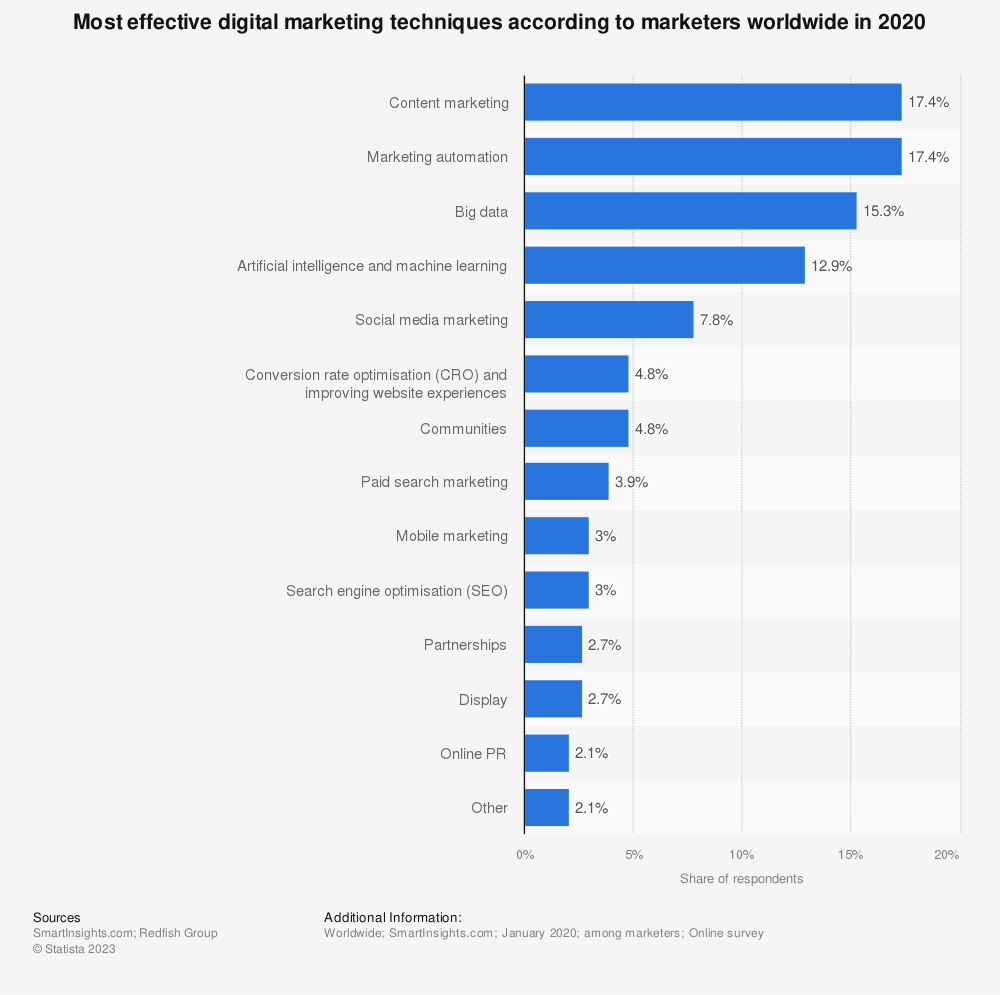
Source: Statista.com
Modern digital marketing stands on the shoulders of marketing automation. Numerous activities like social listening and developing a strong content strategy for SEO would be impossible without the aid of specialized automation tools.
However, enterprise-grade marketing automation solution goes beyond merely facilitating such tasks. It fully transforms your business, bolstering profitability across the board.
But how does marketing automation work and what makes it so impactful? Here are five advantages of marketing automation.
Enhanced efficiency and time-saving
Automating repetitive tasks like email campaigns, social media scheduling, and lead nurturing streamlines operations, freeing up valuable time for strategic planning and creativity. Your team is free to come up with innovative ideas and creative plans to raise brand awareness while the tools take care of the trivial tasks.
Not only does it expedite the sales and marketing teams operations, but it also helps ensure consistent and timely engagement with prospects and customers, optimizing sales processes and team productivity.
Improved lead management
Marketing automation software streamlines lead scoring, ensuring that you don’t miss out on any potential customers. Once the tool identifies a lead, it can automatically deliver personalized content to bring them further down the sales funnel. Besides the initial setup and occasional tweaks, there’s almost no need for you to get involved – all the lead management can be done by the algorithm.
Cross-department integration
Marketing, Sales, and Customer Service are closely linked. Marketing creates leads that are nurtured and converted by Sales while the quality of customer service affects your brand reputation which is built through marketing. Naturally, there is a need for collaboration across all these departments.
The best marketing automation platforms can be easily integrated with sales and service automation solutions such as CRMs, which allows you to exchange customer data and insights across the company.
Data-driven decision making
Speaking of data, powerful customer analytics are intrinsic to most marketing automation tools. They empower you to utilize insights based on behavioral and demographic data to plan your marketing strategy, identify gaps in your campaigns, and find the best ways to reach your audience.
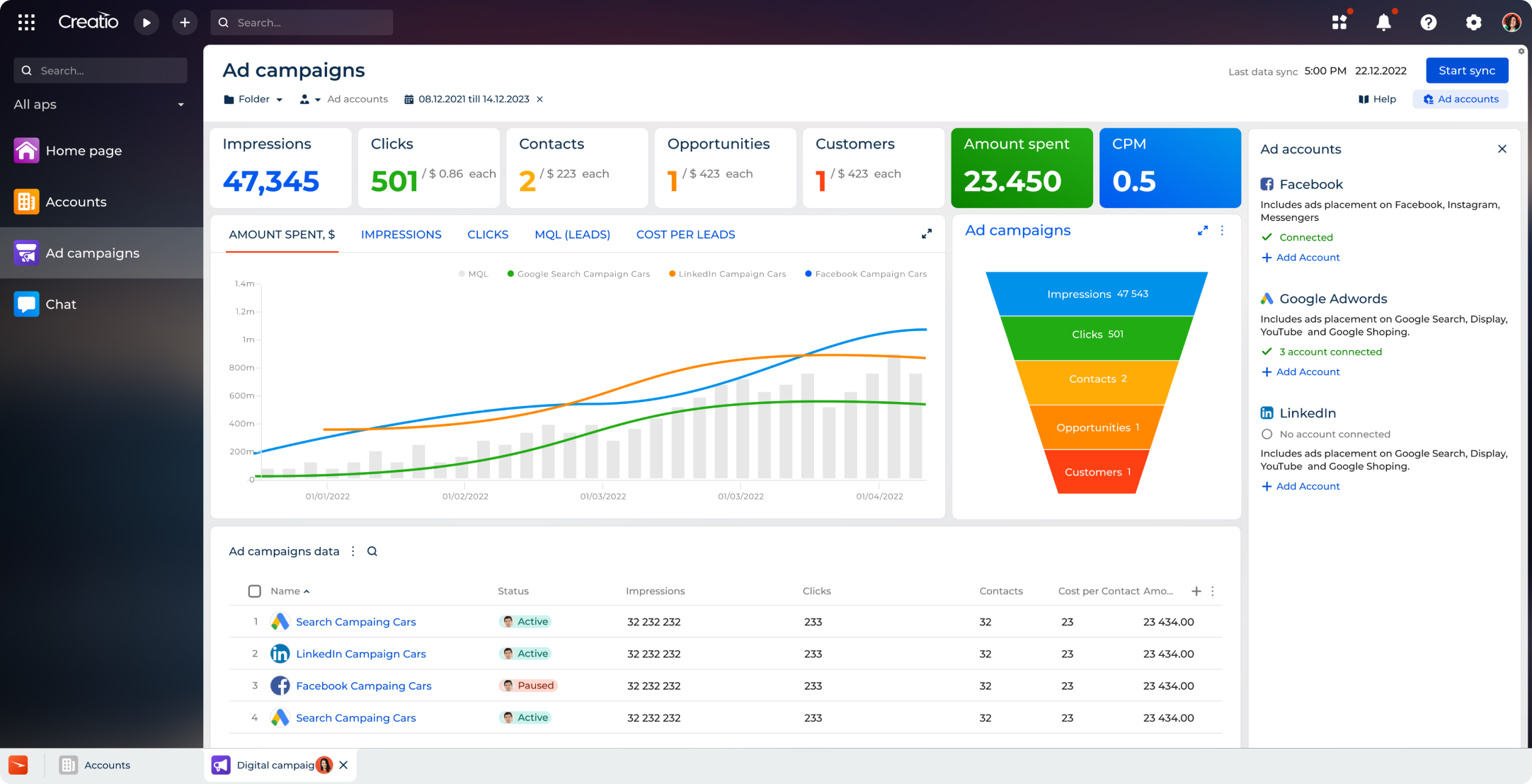
Digital ads analytics dashboard
Scalable and consistent marketing campaigns
Marketing automation enables you to easily scale all your activities when needed, including email campaigns, social media outreach, targeted advertising, etc. It enables your business to handle an increase in data points or leads being processed without halting the operations or overwhelming your marketing team.
Role of CRM in Marketing Automation
A marketing CRM (customer relationship management) is a type of marketing automation software that consolidates your customer data, interactions, and marketing activities such as lead generation in one platform. All the customer data accumulated in a CRM can be used by your marketing team to plan and execute more effective and personalized marketing campaigns, as well as have better visibility into each step of the customer lifecycle together.
As the best marketing automation software, Creatio Marketing enables you to take advantage of the following capabilities:
- Powerful analytics and access to a holistic customer 360-view
- Effortless and quick target segmentation
- Automation of omnichannel marketing campaigns
- Streamlined lead management
- Digital advertising tracking and management
- Automation of repetitive tasks
- Simplified marketing collaboration
- Event management
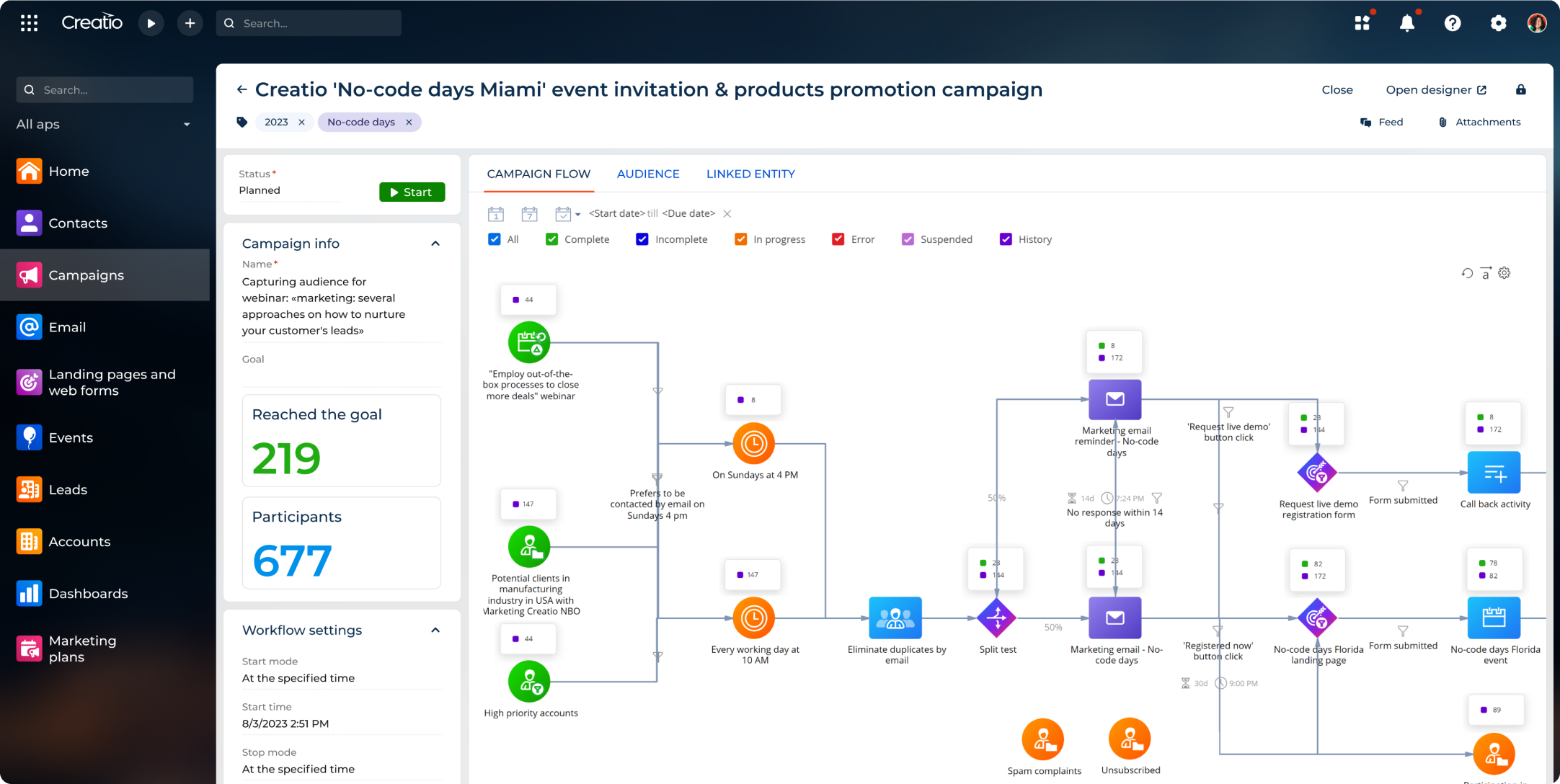
Creatio marketing automation platform offers robust no-code tools to help you easily build and manage highly customized lead management processes, execute marketing campaigns of any complexity, and create intelligent customer engagement strategies with AI-powered predictive scoring, product recommendations, next-best-action/next-best-offer suggestions, etc.
Creatio easily connects with your existing ecosystem of automation software, be it sales automation, messaging, data visualization apps, and more. Whatever marketing software you’re already using, it can seamlessly integrate with Creatio Marketing, enabling smooth data exchange between systems.
In Conclusion
In today's marketing landscape, the adoption of marketing automation stands as not just a choice but a strategic imperative. Its ability to optimize processes, drive engagement, and deliver personalized customer experiences benefits both businesses and customers and contributes to your limitless growth.
FAQ
What are the different types of marketing automation?
There are many ways to automate marketing, and their usage depends on your business goals. Here's a breakdown of different types:
- Customer relationship management (CRM) automates lead management and enables cooperation between marketing and sales.
- Email marketing automates personalized email campaigns based on triggers.
- Social media marketing automation helps schedule posts, monitor engagement, and analyze your metrics and online conversations.
- Content marketing automation aids in content creation, curation, and distribution. It includes tools enabling SEO and online media monitoring.
- Analytics and reporting software collects, analyzes, and presents marketing data.
- Ad campaign automation manages and optimizes advertising campaigns across channels.
- Personalization and targeting automation helps customize marketing based on user behavior.
Is marketing automation part of CRM?
Marketing automation can be a part of a CRM system, but it also exists as a standalone tool or platform dedicated solely to automating marketing-related activities. Integrating both ensures a more cohesive and effective marketing automation strategy by aligning customer data with marketing activities, leading to more targeted and personalized campaigns.
How do you automate marketing?
Once you’ve picked a marketing automation platform and given it access to your data (e.g. connected your social media and website analytics), here’s how to proceed:
- Start with audience segmentation. It will help you identify your customer personas and audience engagement channels.
- Utilize Customer 360-view to analyze customer journey and set up your lead management dashboard to identify processes that can be automated. Creatio Marketing offers both of these as composable apps that you can tailor to your needs.
- Set up workflows to automate routine marketing processes and lead nurturing.
From there you can tweak and change your operations based on your marketing results and the platform’s analytics.





















































